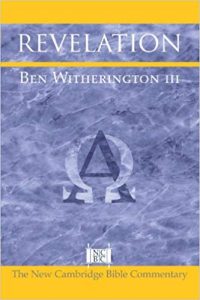The New Cambridge Bible Commentary is a biblical studies reference collection of Old and New Testament books that can be used by pastors, professors, and lay people who can follow in-depth discussion on exegetical and theological issues.

The publisher notes that “commentaries in the NCBC thus will be academically rigorous but will not assume the reader has a great deal of specialized theological knowledge or an impressive command of the Hebrew, Aramaic, or biblical Greek.”
Which commentary series is best for your purposes? See Best Bible Commentaries: Top 50. Based on aggregate reviews.
New Cambridge Bible Commentary (NCBC): Reviews
On the Revelation volume:
“Written by a prolific evangelical scholar, this is a solid commentary on the New Testament’s most enigmatic book. Witherington brings to this work his characteristic emphasis on the social context and literary stucture of the book in question. His extensive introduction is particularly helpful because it traces the history of interpretation of Revelation and charts where recent writings on the book stand. Along the way, the commentary is enhanced with explanations in bold print that take up particular historical issues or problems of interpretation.”
~ The Bible Today
On the 1 Corinthians volume:
“I welcome this admirably concise and clear commentary. A wide range of readers will value Dr. Keener’s ability to focus on the key theological and ethical points Paul makes in his letters to the Corinthians. Dr. Keener is well-acquainted with recent scholarly discussion of these fascinating and complex letters. He includes helpful summaries and quides to further reading, and from time to time he draws out judiciously ways in which Paul’s comments relate to today’s world.”
~ Graham Stanton, University of Cambridge
Purpose of the New Cambridge Bible Commentary
Building upon its reputation as a longstanding publisher of Bibles as well as academic books on biblical studies and theology, Cambridge University Press is pleased to announce the forthcoming release of the New Cambridge Bible Commentary (NCBC) series.
Like the original Cambridge Bible Commentary – a collection of exegetical volumes widely read and studied in the 1960s and 1970s – the NCBC aims to elucidate the Hebrew and Christian scriptures for a wide range of intellectually curious individuals. Commentaries in the NCBC thus will be academically rigorous but will not assume the reader has a great deal of specialized theological knowledge or an impressive command of the Hebrew, Aramaic, or biblical Greek. Unlike the earlier CBC, however, the new series will take advantage of many of the rewards provided by scholarly research over the last three decades.
While not mistaking trendiness for truth, volumes in the NCBC will make accessible and build upon many of the advances in theory and theology produced in universities and seminaries during the last thirty years. Utilizing recent gains in rhetorical criticism, social scientific study of the scriptures, narrative criticism and other developing disciplines, this series intends to provide a fresh look at biblical texts, taking advantage of the growing edges in Biblical Studies.
Volumes in the New Cambridge Bible Commentary
The links below go to Amazon, which sells new and used books. Also visit Christian Book Distributors’ NCBC commentaries page to compare prices.
This book is a verse-by-verse analysis of the New Testament Gospel of Matthew. It provides a comprehensive introduction to the Gospel, which describes the world of Jesus and his first followers. This commentary explores the historical, social and religious contexts of Matthew and examines the customs, beliefs and ideas that inform the text. Unfamiliar to many readers of the New Testament, this background will help readers fully understand the text of Matthew, which focuses on what Jesus taught and why the religious authorities in Jerusalem rejected his message and gave him up to the Roman governor for execution. This book will be an important tool for the clergy, scholars and other interested readers of Matthew.
This volume provides a comprehensive, accessible introduction to the Gospel of Mark, now widely considered the first recorded treatment of Jesus. Darrell Bock explains how this text, once the least-used gospel, came to be regarded as the starting point for understanding Jesus. Drawing together previous arguments and discussion in a constructive summary, he traces the significance of Mark and addresses key features such as its cultural and historical background, its narrative flow, and the role of Greek in supplying meaning. This commentary highlights the issues Mark’s gospel raises and develops Mark’s message surrounding Jesus’ claims of kingdom authority and salvation, the call to disciples to follow him, and the preparation of those disciples to face suffering in light of their choice. Mark will be a valuable resource for students, teachers, and pastors alike.
1-2 Corinthians – Craig S. Keener
This commentary explains 1 and 2 Corinthians passage by passage, following Paul’s argument. It uses a variety of ancient sources to show how Paul’s argument would have made sense to first-century readers, drawing from ancient letter-writing, speaking, and social conventions. The commentary will be of interest to pastors, teachers, and others who read Paul’s letters because of its readability, firm grasp of the background and scholarship on the Corinthian correspondence, and its sensitivity to the sorts of questions asked by those wishing to apply Paul’s letters today. It will also be of interest to scholars because of its exploration of ancient sources, often providing sources not previously cited in commentaries.
This commentary offers a concise, incisive view of Galatians, Paul’s most polemical letter. Here, Paul is fighting for the spiritual life and loyalty of some of his hard-won converts. Taking advantage of a range of persuasive rhetorical approaches, his letter appears to bristle with anger at the interlopers and the anguish of spurned affection. In this commentary, Craig S. Keener mines insights from the ancient world to highlight Paul’s persuasive tactics and how the Galatian Christians would have heard his intense yet profound message. In so doing, Keener also helps readers to confront Galatians afresh today, so they can hear more closely what Paul is and is not saying for the church universal. Drawing on a wide range of ancient Mediterranean sources to reconstruct the context of Galatians, Keener helps us to grasp the issues that Paul was addressing, the reasons that Paul wrote the letter, and its continuing relevance for contemporary audiences.
Revelation – Ben Witherington, III
This book was the first of its kind: a socio-rhetorical commentary on the Book of Revelation. Without sacrificing scholarly perspective or academic rigor, it is written to be accessible for a wide audience – including pastors, scholars, teachers, seminarians, and interested lay people. A ‘Suggested Reading List’ – a feature of all volumes in the New Cambridge Bible Commentary – will serve as point of entry for the new student of Revelation and as a helpful annotated bibliography for all readers. Frequent ‘Closer-Look’ sections examine key elements of the Roman-Greco world that bear on the text’s meaning while ‘Bridging the Horizons’ sub-chapters connect this world with the cultural, political, and religious environments of today. The entire NRSV translation is provided throughout the text. Award-winning author Ben Witherington, III brings a New Testament-scholar’s insight and successful clergyman’s lucidity to the often opaque passages of the last book of the New Testament.
Psalms – Walter Brueggemann, William H. Bellinger, Jr
This text introduces the book of Psalms and provides an exposition of each psalm with attention to genre, liturgical connections, societal issues and the psalm’s place in the book of Psalms as a whole. The treatments of the psalms feature a close look at particular issues raised by the text and the encounters between the world of the psalm and the world of contemporary readers. The exposition of each psalm provides a reader’s guide to the text in conversation with relevant theological issues.
This commentary is an innovative interpretation of one of the most profound texts of world literature: the book of Genesis. The first book of the Bible has been studied, debated, and expounded as much as any text in history, yet because it addresses the weightiest questions of life and faith, it continues to demand our attention. The author of this new commentary combines older critical approaches with the latest rhetorical methodologies to yield fresh interpretations accessible to scholars, clergy, teachers, seminarians, and interested laypeople. It explains important concepts and terms as expressed in the Hebrew original so that both people who know Hebrew and those who do not will be able to follow the discussion. ‘Closer Look’ sections examine Genesis in the context of cultures of the ancient Near East. ‘Bridging the Horizons’ sections enable the reader to see the enduring relevance of the book in the twenty-first century.
This commentary views Exodus as a cultural document, preserving the collective memories of the Israelites and relating them to the major institutions and beliefs that emerged by the end of the period of the Hebrew Bible. It is intended to help the reader follow the story line of Exodus, understand its socio-cultural context, appreciate its literary features, recognize its major themes and values, and also note its interpretive and moral problems. It explains important concepts and terms as expressed in the Hebrew original so that both people who know Hebrew and those who don’t will be able to follow the discussion. Frequent ‘closer look’ sections examine key elements of the Ancient Near East that bear on the text’s meaning, while ‘Bridging the Horizons’ articles connect this world with the cultural, political and religious environments of today.

